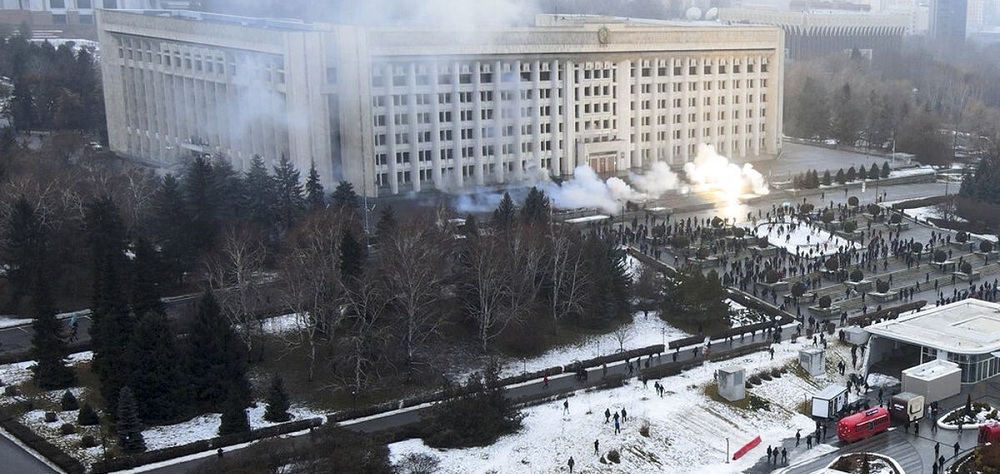Alwaght- Situation is yet to be calm in Kazakhstan where unrest and clashes between the government forces and protestors, some of them armed, gripped the country since last week.
Kazakhstan officials say more than 4,000 people have been detained in recent days. Protests in Kazakhstan were sparked by rising fuel prices, but as unrest spread, protesters raised other demands, including political freedoms.
Kazakhstan's President Kassym-Jomart Tokayev has ordered suppression of the protests and told security forces that they can fire on protesters without warning.
With the country calm and secure for years, the unfolding riots raise various speculations about the main reasons behind the fast-moving developments.
An internal dispute?
When the protests in Kazakhstan began last Wednesday, these developments were unexpected for many. Although the protests were rooted in discontentment about fuel price hike, since the beginning, some said they are a result of internal strife in Kazakhstan, adding the protests were exploited, if not planned, by incumbent President Tokayev and aimed at reducing pressure and influence of the former President Nursultan Nazarbayev. The speculations went broader especially after rumors of Nazarbayev fleeing the country were circulated. On Saturday, Nazarbayev's spokesman rejected the news, saying that the founder of modern Kazakhstan was in the capital. His Twitter post said that the ex-president is in the country, held some consultation meetings, and kept in touch with Tokayev. He also, the spokesman continued, "talked to leaders of friendly countries and called on the people to unite around support for the current president to weather the current conditions."
There has been denial of rumors of Nazarbayev's departure, but there is no doubt that Tokayev made the most of the current protests to reduce Nazarbayev's power. Although Nazarbayev has not been president since 2019, he has retained his influence and power in the former Soviet republic. It seems that Tokayev is seeking to distance Nazarbayev from power and that appears why he was dismissed from the presidency of the powerful National Security Council amid the demonstrations.
Nazarbayev ruled the country for about three decades with an iron fist and attracted hundreds of billions of dollars in foreign investment for energy and mining sectors. With extreme guile, he established balanced relationship with strong neighbors Russia and China. But he was intolerant of opposition and accused by West and rights organizations of human rights abuses and violation of democratic freedoms. A large part of the country's economy is estimated to be at his family's hands and after his dismissal from the National Security Council as his powerhouse things are unclear how would develop for him.
However, the continuing protests in Kazakhstan show that the issue goes far beyond the internal power dispute, although it provided an appropriate opportunity to settle political scores. On Saturday, National Security Committee declared arrest of Karim Masimov who was also sacked from his post during the protests as the committee's chief. Masimov it an ally of Nazarbayev and served as prime minister from 2007-2012 and from 2014-2016. His removal and arrest is seen as part of a purge campaign pushed by the current president.
Impasse of color revolution in Kazakhstan
The protests in Kazakhstan have provoked widespread international reactions, with Russia reacting so seriously that it has deployed troops under a peacekeeping mission within the framework of Collective Security Treaty Organization (CSTO), a Russian-led regional security bloc. About 2,500 troops with heavy equipment from several Central Asian countries are currently stationed in Kazakhstan under the command of Russian peacekeeping mission. Moscow said the deployment came at the behest of the Kazakh president. At the same time as Russian troops are being sent to Kazakhstan, a BBC correspondent reported that the central square of Almaty has become a "battlefield" and the sound of machine gun fire can be heard overnight in Kazakhstan's largest city.
Russia is very worried that instability and insecurity in Kazakhstan will be extended to Russia, and therefore will not accept unrest in Kazakhstan under any circumstances.
On the other hand, the deployment of Russian-led peacekeeping forces in Kazakhstan has been met with a US reaction, with a White House spokesman questioning the legality of the dispatch. So far, the US response to Kazakhstan's developments has been conservative, but at the same time many have said that Kazakhstan's unrest is rooted in the West's plotting against Russia. In other words, the US-led West is trying to divert Russia's focus from tensions in Ukraine to the situation in Kazakhstan by orchestrating protests. Some experts suggest that Kazakhstan protests bear hallmarks a color revolution, a series of Western-arranged government changes in neighbors of Russia since the 2000s.
But leaders of regional states, including Armenia, Turkey, Tajikistan, and Azerbaijan, in a reaction united with Kremlin's assured Kazakhstan president of support, signaling that they stand by Moscow in these developments.
With regional countries demonstrating alignment of stance with Russia in preservation of Kazakhstan government, Western-eyed color revolution does not seem to have a chance of success in the big and important Central Asian country.



























